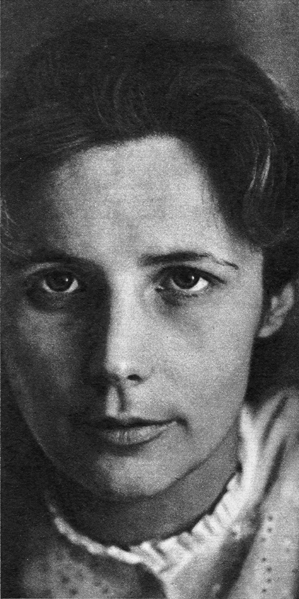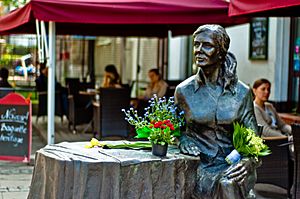Agnieszka Osiecka facts for kids
Quick facts for kids
Agnieszka Osiecka
|
|
|---|---|

Agnieszka Osiecka
|
|
| Born | 9 October 1936 Warsaw, Poland |
| Died | 7 March 1997 Warsaw, Poland |
| Resting place | Powązki Cemetery |
| Occupation | Poet, writer, author of theatre and television screenplays, film director and journalist |
| Language | Polish |
| Nationality | Polish |
| Notable awards | Cross of Merit 1979 |
| Spouse | Wojciech Frykowski 1963-1964, Wojciech Jesionka 1966 |
| Children | Agata Passent |
Agnieszka Osiecka (born October 9, 1936 – died March 7, 1997) was a talented poet, writer, and journalist from Poland. She wrote plays for theatre and television, and even directed films. Agnieszka was famous for writing the words (lyrics) for over 2000 songs. Many people in Poland see her as a very important part of their culture.
Life and Early Career
Agnieszka Osiecka was born in Warsaw, Poland. She was the only child of Wiktor Osiecki, a pianist and composer, and Maria Sztechman. Her dad had roots from Serbia, Romania, and Hungary. Agnieszka spent her first few years in Zakopane, a town where her father played piano at a restaurant.
After World War II, her family moved back to Warsaw. They lived in a small flat in the Saska Kępa area. This flat became Agnieszka's favorite place to work. She lived there for most of her life. After she passed away, a special plaque was placed on the building to remember her.
Agnieszka was a very smart student. She finished high school faster than others and graduated in 1952. She was also a swimmer at the Legia Sports Club. Later, she studied journalism at the University of Warsaw from 1957 to 1961. She also studied film directing at the well-known National Film School in Łódź during the same years. However, she decided to focus on writing instead of directing films.
While at university, Agnieszka wrote many articles for student newspapers. In 1954, she joined the famous Student Satirical Theatre (STS). This was a theatre group that used humor and satire to comment on society. She wrote 166 songs for them. She once said, "I am a journalist, that is why some of my songs are reports which rhyme." She was part of the STS Theatre's artistic team until it closed in 1972.
In 1962, Agnieszka's songs were first heard on Polskie Radio, which is Poland's national radio station. A famous Polish actress, Kalina Jędrusik, sang Agnieszka's lyrics for a popular song called "My First Ball." Just one year later, in 1963, Agnieszka had a big success at the first National Festival of Polish Song in Opole. She won the main prize and six other awards for her song lyrics. Some of these winning songs included "Piosenka o Okularnikach" and "Kochankowie z ulicy Kamiennej."
After this, she became known as an important young poet. Polish National Radio offered her a job to create and lead a team for a radio show called The Radio Song Studio. She also worked on plays for theatre and television. She wrote a series called "Singing Letters" with composer Adam Sławiński. Her first major theatre play, "Let the Apple-trees Bloom," was performed at the Ateneum Theatre. Many famous composers, like Krzysztof Komeda and Seweryn Krajewski, used her lyrics for their music.
Personal Life
Agnieszka Osiecka and her partner, the well-known journalist Daniel Passent, had a daughter named Agata Passent in 1973.
The Masurian Lake District was one of Agnieszka's favorite places in Poland. She loved to spend her holidays there in the 1960s and 70s with other Polish thinkers and artists. When she was a student, she worked for a local newspaper in that area. Later in her life, she wrote for the Atelier Theatre in Sopot. She also often visited the Halama writers' retreat house in Zakopane, located in the Tatra Mountains.
Death and Legacy
Agnieszka Osiecka wrote many books and released many music albums. You can find a full list of her works online. She is seen as one of the most important and talented people in Polish culture and history after World War II.
Agnieszka Osiecka passed away on March 7, 1997, after battling cancer for several years. She is buried in the Powązki Cemetery in Warsaw.
Soon after her death, Agnieszka's daughter created the Agnieszka Osiecka Okularnicy Foundation. This foundation helps to share Osiecka’s work with more people. It keeps her writings safe, organizes a yearly singing competition called "Let us Remember Agnieszka Osiecka," manages an online archive, and publishes her books.
To honor her amazing work, the Music Studio at the National Polish Radio was named after Agnieszka Osiecka in 1997.
Images for kids
See also
 In Spanish: Agnieszka Osiecka para niños
In Spanish: Agnieszka Osiecka para niños
 | Chris Smalls |
 | Fred Hampton |
 | Ralph Abernathy |



